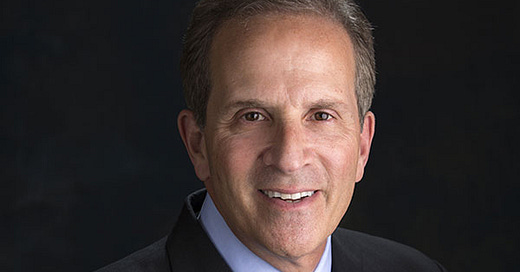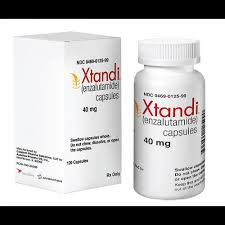ENACT study shows 'enza' significantly slows progression of low-risk prostate cancer
Is there a pill for low-risk prostate cancer? Maybe. But do we need it?
By Howard Wolinsky
A study published June 16 in JAMA Oncology has shown that an anti-cancer medication, enzalutamide (Xtandi), can slow progression in a significant number of patients with low-risk (Gleason 3+3=6) and favorable intermediate risk (Gleason 3+4=7) prostate cancers who otherwise qualified for active surveillance (AS).
Neal Shore, MD, led the randomized study of 227 patients with low-risk or intermediate-risk localized prostate cancer, treatment, which slowed the progression of tumors in patients with low-risk and favorable intermediate-risk prostate cancer.
“Enza” was well tolerated.
“Compared with active surveillance (AS) alone, enzalutamide significantly reduced the risk of pathological or therapeutic prostate cancer progression by 46%,” Shore, medical director for the Carolina Urologic Research Center (Myrtle Beach, S.C.). and colleagues said in JAMA Oncology. (https://jamanetwork.com/journals/jamaoncology/article-abstract/2793572)
They note that compared with AS, “odds of a negative biopsy result were 3.5 times higher; there was a significant reduction in the percentage of cancer-positive cores and the odds of a secondary rise in serum PSA levels at 1 year with treatment with enzalutamide; no significant difference was observed at 2 years.”
(Neal Shore, MD)
“To our knowledge, ENACT represents the first trial to compare the effects of a novel androgen receptor antagonist as monotherapy vs AS in patients with low-risk or intermediate-risk localized prostate cancer. Results suggest that enzalutamide may offer an alternative short-term treatment option for this patient population, potentially reducing the need for more aggressive treatment approaches,” Shore et al. said.
Treatment with enzalutamide also significantly delayed PSA progression by 6 months vs AS, The most commonly reported adverse events during enzalutamide treatment were fatigue (62 [55.4%]) and gynecomastia (enlarged breats) (41 [36.6%]). Three patients in the enzalutamide arm died. None were receiving the study drug at the time of death. No deaths were considered treatment-related, Shore said.
Enzalutamide, sold under the brand name Xtandi, is a nonsteroidal antiandrogen medication, used in the treatment of prostate cancer. (https://www.xtandi.com/how-to-take?gclid=CjwKCAjw77WVBhBuEiwAJ-YoJCh3SFkFrWhDvUwk8XXW_oL_e4_t_aU2Ad_fhtavNTJojMCEHVxSnRoCH4gQAvD_BwE&gclsrc=aw.ds) Pfizer and Astrellas are the manufacturers.
It is used to treat men with prostate cancer that:
no longer responds to a hormone therapy or surgical treatment to lower testosterone
OR
has spread to other parts of the body and responds to a hormone therapy or surgical treatment to lower testosterone
For information on side effects, such as seizures, go to https://bit.ly/3mWHZna
The findings on enza are intriguing. It caused decreased progression of prostate cancer (almost 50%).
Drug companies typically have had no interest in patients like us. Simple formula--no bucks on the table, fuck ‘em.
The companies ignored the fact that many AS patients will move over to active treatment within a few years because of “progession” (new more advanced cancers discovered on biopsies; Gleason 6 cancers don’t themselves cause harm) or “depression,” the inability of some men to tolerate anxious surveillance.
Back in 2018, I made the rounds at the Prostate Cancer Research Institute meeting in LA looking for funding for an international meeting being planned by Active Surveillance Patients International, which I helped to found.
Drug company reps were friendly but saw zero opportunities to work with AS patients. They wished us well and that was it.
But this has been changing.
So this research and other research may perk up interest in AS patients as a potential revenue source. Shore seems to have an interest in finding ways to improve care of patients who otherwise would qualify for AS.
He also has researched sipuleucel-T (Provenge, Dendreon). (In 2010, Provenge became the first-ever immunotherapy for metastatic prostate cancer to be approved by the US Food and Drug Administration, albeit in a protracted and controversial process. In the final data set, it improved overall survival by 4 months compared with placebo.)
Will low-risk patients have to choose eventually between expensive and potentially toxic drug therapy and AS? Will drugs be a good alternative for men on anxious surveillance?
Are there ethical concerns about treating patients who otherwise could go on active surveillance without facing drug toxicity but still facing risks such as sepsis from transrectal biopsies? And what about the expense?
Daniel Spratt, MD, Chair of Radiation Oncology University Hospitals Seidman Cancer Center Case Western Reserve University, tweeted, that he thought ”KOLs/authors (key opinion leaders, FYI)” acted “appropriately” with the research?
Then he commented on focal therapy being given outside of research and causing significant side effects, physical and financial. He said: “(heck people are giving focal tx [treatment] off trial causing serious toxicity and financial tox), and the ‘benefit’ is not sufficient for adoption as patients progressed on and after finishing enza …”
Researchers said the study was conducted in accordance with International Council for Harmonization guidelines, applicable local laws, regulations, and guidelines governing clinical study conduct, as well as ethical principles derived from the Declaration of Helsinki. The study was approved by the independent ethics committee or institutional review board at each study site.
And is the cost of the medicine, maybe $150,000 wholesale per year, acceptable? AS care costs maybe $1,000 per year for office visits and various blood tests, plus more for MRIs and biopsies.
Susan Halabi, MD, of Duke University said: “While these data highlight a decreased risk in the progression of prostate cancer in some patients undergoing AS, it raises many questions, particularly concerning the selection of those patients most likely to benefit from treatment with enzalutamide and appropriate endpoints to make that judgment.”
Spratt said, “The trial is a self-fulfilling prophecy that you will delay progression at the expense of significant toxicity (remember in this population ANY toxicity is significant).” (Emphasis added.) He felt the study was ethically acceptable.
Final thoughts: Intriguing idea. Enza isn’t ready for prime time. Watch for other manufacturers to try to penetrate the emerging “AS market.” Active surveillance is maturing and becoming a potential target by drug manufacturers. Is that a good thing?
Shore reported personal fees from Astellas and Pfizer during the conduct of the study, as well as personal fees from Bayer, AstraZeneca, Janssen, Dendreon, Sanofi, Myovant, and Merck outside this study.
Watch for the special Father’s Day edition of The Active Surveillor. Bert Vorstman, MD, the uro heretic, takes a hard look at robotic prostatectomies.





It's good to see that drug companies are starting to look at AS patients as a source of future revenues. As more men join theAS revolution and our numbers grow this should increase our influence with drug manufacturers.
Wouldn't it be wonderful if someday there is a medication available that has minimal side effects that will keep us on AS.
If a person on AS wants to slow progression of a slowly progressing cancer, I would recommend using intermittent 50mg or less of bicalutamide (casodex is the brand name). A month's supply of 50 mg bicalutamide is only about $10.00 with most insurance or medicare. Hitting a GS 3 + 3 with enzalutamide is like squashing an ant with a sledge hammer.